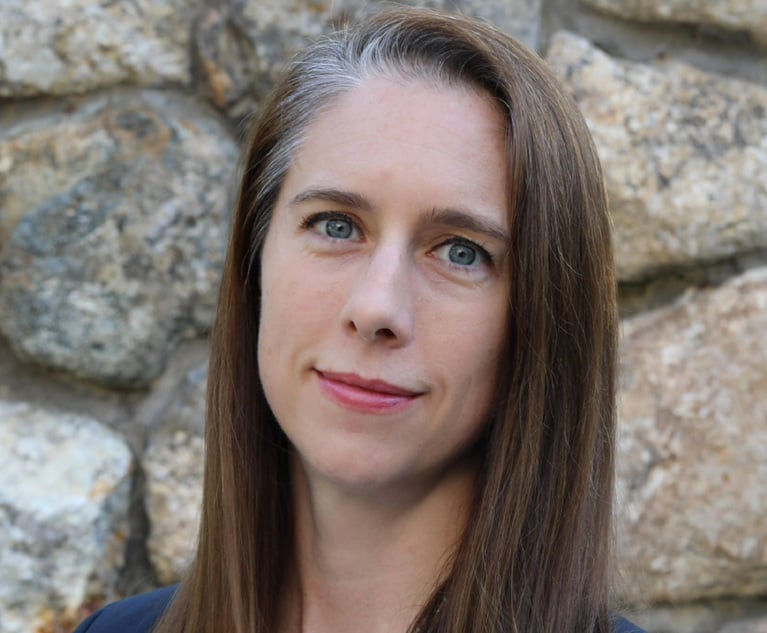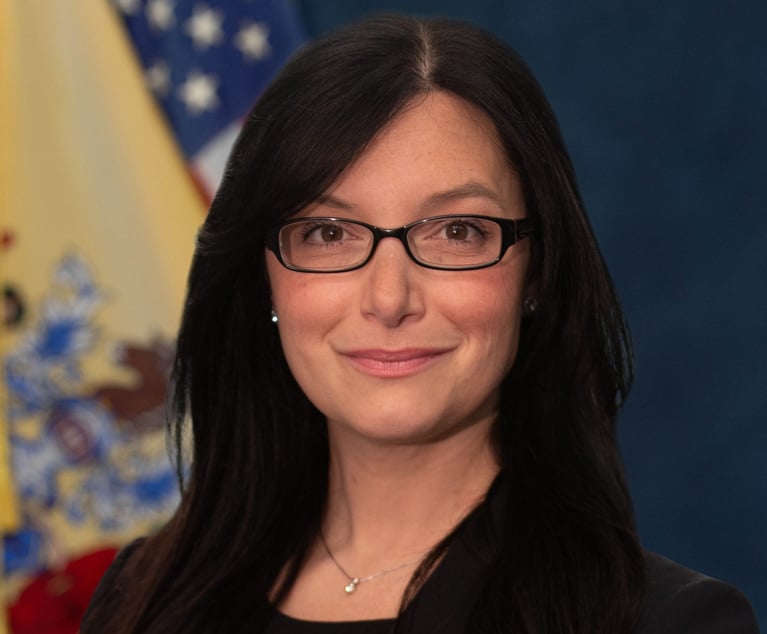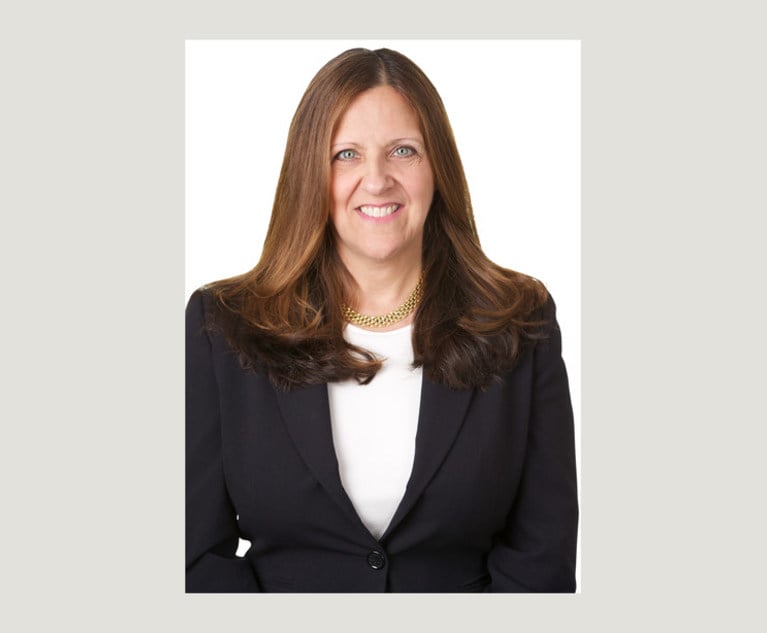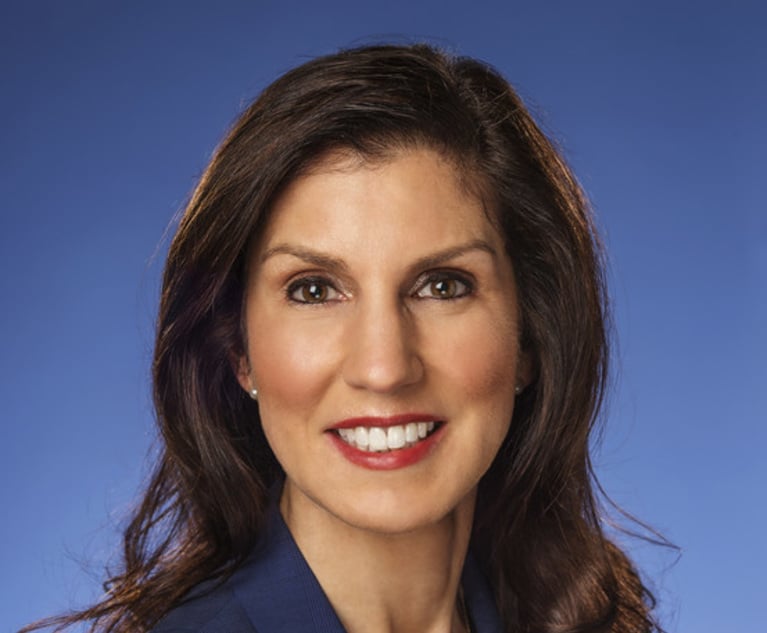 Alma Saravia of Flaster Greenberg, Cherry Hill, NJ – Photo by Carmen Natale/ALM
Alma Saravia of Flaster Greenberg, Cherry Hill, NJ – Photo by Carmen Natale/ALMAlma Saravia Marks 'Three Distinct Legal Careers'
"I have had three distinct legal careers which I never contemplated when I attended Rutgers Law School in Camden night after night, while working at the Legislature."
June 10, 2019 at 06:15 PM
4 minute read
Alma Saravia of Flaster Greenberg in Cherry Hill has left her mark in state government, not only as a lawyer but also as a policymaker. As director of the Division of Mental Health Advocacy, she represented the interests of those committed to psychiatric hospitals, and she also was Gov. James Florio's designee on the New Jersey Board of Medical Examiners. In private practice she represents health-care professionals in licensure and other matters, and, on the policy side, has been deeply involved with marijuana legislation in the state and continues to influence policy as a lobbyist, including lobbying efforts on behalf of advanced practice nurses. She also has been active in professional organizations and community involvement.
Objectively, what key moments or accomplishments have defined your career?
During my tenure at the Legislature, I served as the executive director of the Commission on Sex Discrimination in the Statutes, where I spearheaded the enactment of the first Domestic Violence Act, obtaining new child support obligations through the Probation Department, the enactment of factors for alimony, rehabilitative alimony, child custody and equitable distribution of property as well as the state's Family Leave Act. As the director of the state's Division of Mental Health Advocacy, we filed class action lawsuits to close down the children's hospital and to create a program for deaf patients who were deprived of basic sign language services, among other abuses. In private practice, I have advocated for the right of advanced practice nurses to perform their profession without unnecessary restrictions. Most recently, I have been involved with the medical marijuana and adult-use legislation.
Subjectively, what are your proudest or most personally satisfying achievements?
My proudest achievement is the enactment of almost 50 bills recommended or endorsed by the Commission on Sex Discrimination in the Statutes.
How is success best achieved and sustained?
Success is best achieved and sustained by working with all interest groups and agreeing to “disagree” on some items. Additionally, it is achieved by persevering to get legislation enacted even if it does not contain all of the provisions hoped for. The law can always be amended to strengthen it. Change is incremental, and possible without losing sight of the bottom-line goal.
How are the business and profession of law changing, and are New Jersey lawyers well-positioned for the future?
The use of technology is both a blessing and a bane to attorneys. The internet age has resulted in new ways of communicating with clients and colleagues. However, it is easy to forget about the importance of personal relationships developed through activities such as the New Jersey State Bar Association. Younger lawyers may not develop collegial relationships with their peers and judiciary if they are focused on the screen in front of them!
What advice would you give to someone contemplating a career in law, or someone whose career in law has not been satisfying so far?
I always ask the person if he or she is entrepreneurial. Practicing law is running a business while providing competent legal services. Many lawyers are excellent attorneys, but they are not adept at operating a law firm. I also ask them if they know what type of an attorney they wish to be—i.e. working in government, legal services, at a law firm or perhaps in house. I find that someone who is “fixed” on a set area without any experience in the law, may foreclose himself or herself from unknown future opportunities which would be rewarding and satisfying. I have had three distinct legal careers which I never contemplated when I attended Rutgers Law School in Camden night after night, while working at the Legislature. When Gov. Florio was not re-elected, I knew that I had to reinvent myself again. Gov. Florio had appointed me to serve as his designee to the Board of Medical Examiners. This interesting and previously unknown area of law appealed to me, so I decided to become a health-care attorney representing physicians and other health-care professionals before the licensing boards. I joined the American Health Lawyers Association and after many lunches and meetings with lawyers across the State, I was hired by Duane Morris to establish their New Jersey health-care practice. The lesson for young attorneys is to believe in yourself and to look at your career as a continuum. There are always new opportunities around the corner if you are willing to do the hard work of finding new ways of practicing law.
This content has been archived. It is available through our partners, LexisNexis® and Bloomberg Law.
To view this content, please continue to their sites.
Not a Lexis Subscriber?
Subscribe Now
Not a Bloomberg Law Subscriber?
Subscribe Now
NOT FOR REPRINT
© 2024 ALM Global, LLC, All Rights Reserved. Request academic re-use from www.copyright.com. All other uses, submit a request to [email protected]. For more information visit Asset & Logo Licensing.
You Might Like
View All
For Lawyers, the 'Work' of Making an Impact Does Not Have to Happen in a Courtroom. Laura E. Sedlak Says

Doing the Right Thing in the Pursuit of Justice Requires Guts, Says Lyndsay Ruotolo

One Can be Most Impactful When Their Pursuits Are Driven by Their Concerns and Passions, Says Sherilyn Pastor

As a Lawyer, You Have a Powerful Way to Make an Impact, Says Mary Frances Palisano
Trending Stories
Who Got The Work
Michael G. Bongiorno, Andrew Scott Dulberg and Elizabeth E. Driscoll from Wilmer Cutler Pickering Hale and Dorr have stepped in to represent Symbotic Inc., an A.I.-enabled technology platform that focuses on increasing supply chain efficiency, and other defendants in a pending shareholder derivative lawsuit. The case, filed Oct. 2 in Massachusetts District Court by the Brown Law Firm on behalf of Stephen Austen, accuses certain officers and directors of misleading investors in regard to Symbotic's potential for margin growth by failing to disclose that the company was not equipped to timely deploy its systems or manage expenses through project delays. The case, assigned to U.S. District Judge Nathaniel M. Gorton, is 1:24-cv-12522, Austen v. Cohen et al.
Who Got The Work
Edmund Polubinski and Marie Killmond of Davis Polk & Wardwell have entered appearances for data platform software development company MongoDB and other defendants in a pending shareholder derivative lawsuit. The action, filed Oct. 7 in New York Southern District Court by the Brown Law Firm, accuses the company's directors and/or officers of falsely expressing confidence in the company’s restructuring of its sales incentive plan and downplaying the severity of decreases in its upfront commitments. The case is 1:24-cv-07594, Roy v. Ittycheria et al.
Who Got The Work
Amy O. Bruchs and Kurt F. Ellison of Michael Best & Friedrich have entered appearances for Epic Systems Corp. in a pending employment discrimination lawsuit. The suit was filed Sept. 7 in Wisconsin Western District Court by Levine Eisberner LLC and Siri & Glimstad on behalf of a project manager who claims that he was wrongfully terminated after applying for a religious exemption to the defendant's COVID-19 vaccine mandate. The case, assigned to U.S. Magistrate Judge Anita Marie Boor, is 3:24-cv-00630, Secker, Nathan v. Epic Systems Corporation.
Who Got The Work
David X. Sullivan, Thomas J. Finn and Gregory A. Hall from McCarter & English have entered appearances for Sunrun Installation Services in a pending civil rights lawsuit. The complaint was filed Sept. 4 in Connecticut District Court by attorney Robert M. Berke on behalf of former employee George Edward Steins, who was arrested and charged with employing an unregistered home improvement salesperson. The complaint alleges that had Sunrun informed the Connecticut Department of Consumer Protection that the plaintiff's employment had ended in 2017 and that he no longer held Sunrun's home improvement contractor license, he would not have been hit with charges, which were dismissed in May 2024. The case, assigned to U.S. District Judge Jeffrey A. Meyer, is 3:24-cv-01423, Steins v. Sunrun, Inc. et al.
Who Got The Work
Greenberg Traurig shareholder Joshua L. Raskin has entered an appearance for boohoo.com UK Ltd. in a pending patent infringement lawsuit. The suit, filed Sept. 3 in Texas Eastern District Court by Rozier Hardt McDonough on behalf of Alto Dynamics, asserts five patents related to an online shopping platform. The case, assigned to U.S. District Judge Rodney Gilstrap, is 2:24-cv-00719, Alto Dynamics, LLC v. boohoo.com UK Limited.
Featured Firms
Law Offices of Gary Martin Hays & Associates, P.C.
(470) 294-1674
Law Offices of Mark E. Salomone
(857) 444-6468
Smith & Hassler
(713) 739-1250






